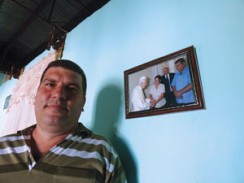By Rhina Guidos (Fourth in a Series)

EL COBRE, Cuba (CNS) – On an island with few treasures, the biggest one Omar Ramirez possesses hangs on a wall. It’s a photo of Ramirez and his wife privately meeting Pope Benedict XVI during his visit to El Cobre. When he visited the nearby Shrine of Our Lady of Charity of El Cobre, the pope stayed at the retreat house where Ramirez is the caretaker.
No one but the pope, his entourage and the Ramirezes were allowed to stay on the property, which is next door to the shrine that is home to the patroness of Cuba.
Ramirez said he never imagined he’d one day see, much less meet, a pope. Since they were the only ones allowed in the retreat house, they cooked and served Pope Benedict’s meals, and Ramirez’s wife ended up ironing the pope’s alb.
The caretaker likes to tell visitors that the pope did not eat much and, when he was done with his food, Ramirez ate his leftovers.
••• ••• •••
Each morning, the gifts are carefully arranged on the table. Many are baby booties or clothes for newborns, and some have been brought to Our Lady of Charity of El Cobre by those who promised to visit her shrine if she interceded for them in their plea of having a child.
The offerings of thanksgiving for a miracle granted are many, so many. Those that can be used, such as the baby clothes, are given to people who cannot afford such items. But some are left to be admired, and they tell the story of a contemporary Cuba. One has a note asking for the protection and reunification of family members in the U.S., Cuba and Mexico. Some are keys to recently bought homes in a country that, since the 1959 revolution, didn’t allow for private property until 2011.
One item that particularly stands out is a military hat from the Cuban Revolutionary Armed Forces, unquestionably the most powerful institution on the island. There was a time when seeing anyone of authority in the shrine meant there was some sort of trouble.
What’s striking is that often the “exvotos,” as the Church refers to them, or votive offerings, are made as part of a vow and are an expression of gratitude, but also of publicly declaring faith – something that wasn’t welcome for many years in Cuba.
Those who help set out the display of offerings say that people have brought rum, tobacco, textiles – whatever they have or is meaningful for them and they want to give to the Virgin of Charity.
Some international visitors have dropped off soil from the Berlin Wall. Ernest Hemingway dropped off the gold medal he received after earning the 1954 Nobel Prize for literature for “The Old Man and the Sea,” inspired by Cuba.
Caretakers say one woman brought water from her well because it was the only thing she had, but also the most precious.
The mother of Fidel and Raul Castro also is said to have dropped off an offering at the sanctuary after her sons emerged safe and alive following the revolt that ultimately led them to power.
